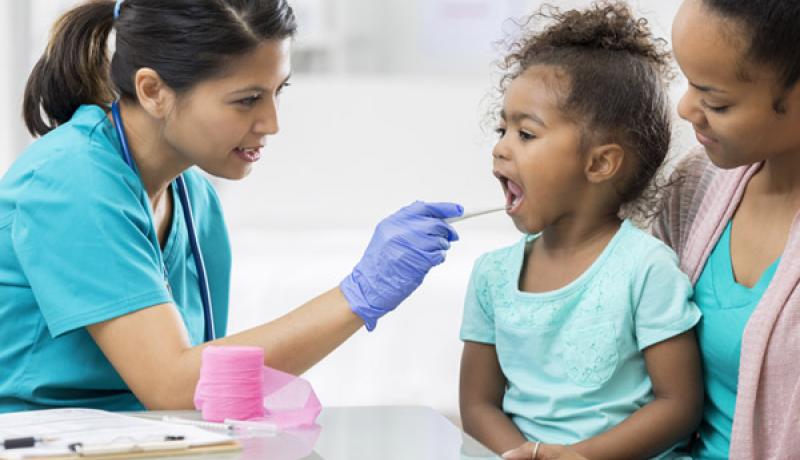New School Nurse Certification Program; Virtual Open House on July 8

The devastating impact of the COVID-19 pandemic highlighted the vital importance of public health planning and preparation. School nurses are specialists in public health, and are essential members on pandemic preparedness, re-opening and re-entry planning teams.
To help the NJ K-12 schools become better prepared to address public health needs, New Jersey City University (NJCU) is pleased to announce a new program option for School Nurse Certification in the Nursing Department. The new graduate-level School Nurse Certification Program at NJCU is designed to prepare registered nurses with the advanced nursing knowledge and skills required to care for diverse populations of students in the K-12 educational setting. The program is approved by the New Jersey Department of Education in meeting requirements for the Standard Non-Instructional School Nurse Certificate (N.J.A.C. 6A:9B -14.4) and the Standard (Instructional) School Nurse Endorsement (N.J.A.C. 6A:9B-14.3).
"Going through the School Nurse Certificate Program at NJCU made me a better nurse!" --Melissa Millad, BSN, RNC, NJ-CSN ‘15
"Obtaining my school nurse certification from NJCU’s School Nursing Certificate program has equipped me with the knowledge necessary to become an efficient school nurse and health advocate in an educational setting and it boosted my confidence in assuming the school nurse role.” --Chelda Duan BSN, RN ‘20
New Jersey City University has been preparing nurses for this challenging and multifaceted role for more than 70 years, and has been a leader in delivering online graduate school nursing education for more than a decade. The School Nurse Certificate Program, which has historically been offered through the Health Sciences Department at NJCU, is now offered by our Nursing Department. Additionally, we now offer a Master of Science (M.S.) in Nursing with a Specialization in School Nursing!
The new School Nurse Certification Program offers a robust curriculum which integrates content in health office management, school law, special education, mental health and substance use/abuse screening and intervention, and principles of population health. Using the Whole School, Whole Community, Whole Child Model (WSCC) (ASCD & CDC, 2015) approach, the program integrates graduate-level competencies identified in School Nursing Scope & Standards of Practice (ANA & NASN, 2017), and prepares nurses to apply principles of the Framework for 21st Century School Practice™ (NASN, 2016) in the provision of required school health services for students and families. The program emphasizes evidence-based practice and leadership development, preparing students to turn evidence into positive health and academic outcomes.
The program includes a stepwise progression of coursework leading from the Non-Instructional School Nurse Certificate (15 Credits) to the Standard School Nurse Certificate (Additional 6 credits/total 21 credits), to the Master of Science (MS) Degree in Nursing with a Specialization in School Nursing (37 credits). Designed for adult learners, courses are offered in online and blended formats during each term including summer sessions. Blended courses will periodically meet in-class throughout the term, while most interaction will be conducted online. The new program is intended to be taken on a part-time basis and can be completed in 15-18 months. It provides seamless learning experiences and professional growth opportunities to support nurses’ career trajectories.
School nursing is a dynamic, complex, and evolving specialty practice. School nurses serve an essential role in assuring healthy equity and academic success for all children. They bridge the gap between health and education, ensuring that all children, regardless of their health, economic, or social status, have an opportunity for optimum wellness and educational achievement. School nurses provide health services, coordinate care for students with chronic or acute health conditions to minimize disruptions in learning, perform health screenings, conduct disease surveillance, and connect families with needed services.
|
Graduate School Nursing Program Virtual Information Session Join us for a Virtual Information Session to learn more about School Nursing at NJCU Wednesday July 8, 5-6 PM Interact with NJCU Nursing faculty one-on-one during this online event to get all your questions answered! All attendees will receive a $55 application fee waiver! To register go to: https://njcu.edu/SchoolNurseInfo Questions? Contact Ginneh Collins, Assistant Director of Admissions at gcollins@njcu.edu or 201-200-2041. |
The program is now open for enrollment in the Fall 2020 semester, which begins September 1.
For more information, contact:: Dr. Lorraine Chewey, Program Coordinator: lchewey@njcu.edu
Visit: http://njcu.edu/GradNursing
To apply for the new Master of Science (MS) Degree in Nursing with a Specialization in School Nursing go to: https://www.njcu.edu/admissions-aid/graduate-admissions/graduate-degrees/nursing-school-nursing-ms
To apply for the new graduate School Nurse Program (Certificate Only), go to: https://www.njcu.edu/admissions-aid/graduate-admissions/graduate-certificates/school-nursing-certificate
References
American Nurses Association and the National Association of School Nurses (2017). School Nursing:
Scope and Standards of Practice. Silver Spring, MD: Author.
Association for Supervision and Curriculum Development (ASCD). & Centers for Disease Control and
Prevention (CDC). (2014). Whole School, Whole Community, Whole Child – A collaborative
approach to learning and health. Retrieved from
http://www.ascd.org/ASCD/pdf/siteASCD/publications/wholechild/wscc-a-collaborative-approach.pdf
National Association of School Nurses (2016). Framework for 21st Century School Nursing Practice: The
National Association of School Nurses. NASN School Nurse, 31, 45-53.